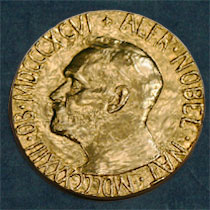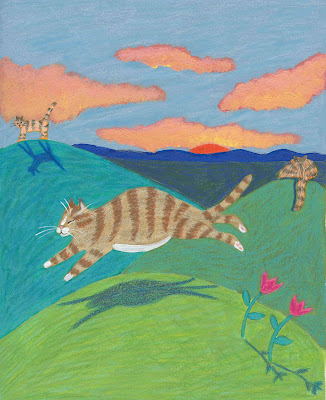This Day in World History
December 10, 1896
Alfred Nobel dies
 Stricken by a cerebral hemorrhage, wealthy industrialist Alfred Nobel died on December 10, 1896. That date is still commemorated as the day on which the famous prizes issued in his name—perhaps the most prestigious prizes in the world—are officially awarded each year.
Stricken by a cerebral hemorrhage, wealthy industrialist Alfred Nobel died on December 10, 1896. That date is still commemorated as the day on which the famous prizes issued in his name—perhaps the most prestigious prizes in the world—are officially awarded each year.
In his thirties, Swedish chemist and engineer Alfred Nobel became interested in explosives and experimented with a chemical named nitroglycerin, but it was very volatile, and accidental explosions frequently occurred. When he accidentally discovered that the liquid was more stable if dried, he had a new invention, which he called dynamite, from which he built a huge fortune. Nobel lived a solitary life: he never married and had little social life, though he was intellectually active and committed to philanthropic causes. In 1895, at sixty-two, he began to develop chest pains. Late in that year, he wrote a will. When he died the following year, his family was shocked to learn that in this will he had left the bulk of his fortune to fund prizes to be given each year to individuals who had made the greatest achievements in chemistry, literature, physiology or medicine, physics, and who had made significant contributions to world peace.
Because his surviving family contested the will, the first Nobel Prizes were not issued until 1901. In 1968, the Bank of Sweden created a sixth award, in economics, named in Alfred Nobel’s honor. The winners of the six awards—called laureates—receive medals and a citation at an awards ceremony each December 10; they also receive a sum of money. All prizes but the peace prize are awarded in Stockholm; that ceremony occurs in Oslo, as a Norwegian committee confers that award. Each laureate gives a lecture in the days preceding the awards ceremony. Some years, more than one person receives a given award. In some years, a prize in a particular field may not be granted.
“This Day in World History” is brought to you by USA Higher Education.
You can subscribe to these posts via RSS or receive them by email.



Just last week my daughter and I were making breakfast when we heard, on the radio, that President Barack Obama won the Nobel Peace Prize. My daughter wanted to know what the prize is. Luckily I had just reviewed a splendid book about Alfred Nobel and I pulled it off my shelf for her to read. If you too have a child who wants to know about these prizes then take a look at the review I wrote about the book.
Alfred Nobel: The Man behind the peace prize
Kathy-Jo Wargin
Illustrated by Zachary Pullen
Non-Fiction Picture Book
Ages 6 to 10
Sleeping Bear Press, 2009, 1585362816
Years ago, when people wanted to build bridges or roads, they had to blast a path for their work using gunpowder - which wasn’t a safe material to work with. One day Alfred Nobel realized that a substance called nitroglycerin might be safer to use than gunpowder.
With the help of his brother and father, Alfred experimented with nitroglycerin until he came up with a solution that he was sure would work. Though his new invention did work well, it still wasn’t as safe as Alfred had hoped it would be. His brother Emil was killed went something went wrong in the lab. Surely there was something else that Alfred could do to make his invention safer still.
Eventually Alfred created something that was safe. It came to be called dynamite and Alfred became a rich and famous man because of his invention. Alfred had hoped that his invention would foster peace, and he was very distressed when he saw that it was being used to harm people. It saddened him to know that many people “saw him as the man who earned his wealth by inventing ways to injure and kill.” Thankfully, Alfred found a way to leave a legacy that would celebrate peace and reward those who gave the world new innovations in science, and who created memorable written works.
This thought provoking and memorable book celebrates the life and achievements of a truly great man.
Please visit this page to find an interesting and very useful teacher's guide for the book.

This is an old illustration I did a few years back that I thought of right away for the word "free." These kitties are so happy and free in this picture. No worries about being on the streets or starving. They're just loving life, being free. Isn't that the way it should be?
 Stricken by a cerebral hemorrhage, wealthy industrialist Alfred Nobel died on December 10, 1896. That date is still commemorated as the day on which the famous prizes issued in his name—perhaps the most prestigious prizes in the world—are officially awarded each year.
Stricken by a cerebral hemorrhage, wealthy industrialist Alfred Nobel died on December 10, 1896. That date is still commemorated as the day on which the famous prizes issued in his name—perhaps the most prestigious prizes in the world—are officially awarded each year.





You so know I love your art, right?
That is just the way it should be!
I love their kitty shadows.
this is wonderrrful, lolo! :))
Really cute. I love it!!
This is wonderful fun! Great piece, Lolo!
Fun - those shadows are great too.